2014 M3 Unit 3 Project
发挥想象,助project板块教学一臂之力论文

发挥想象,助project板块教学一臂之力发挥想象力对于实现project板块教学功能至关重要project板块是《牛津高中英语》教材每个单元的最后一部分教学内容。
它为学生提供了语言实践的机会,是语言的综合运用和输出阶段。
然而在实际的教学中,不少教师都反映project板块教学达不到预期的效果,甚至是违背了教材设置这一部分内容的初衷。
project板块教学现状不容乐观:有的教师将project上成阅读课;有的教师上成语言点讲解课;有的为了赶进度干脆就划划杠杠,找几条有用的短语就马马虎虎敷衍过去。
笔者认为这些做法都反映出教师由于受到教学进度和考试的束缚在教学中缺乏想象力和创造力,不能很好地发挥project板块的教学功能。
爱因斯坦说过:“想象力比知识更重要,因为知识是有限的,而想象力概括着世界的一切,推动着进步,并且是知识进化的源泉。
”丰富的想象是创造的前提,它是创新思维训练的重要手段。
project有 a、b两个部分,a部分的主要功能是为b部分提供范例,而b部分才是project板块的真正核心。
project板块教学的一个重要功能就是要引导学生进行合作探究和创造,使得他们的思维得到训练。
因此,想象力的发挥project板块教学中至关重要。
下面以一节公开课为例:笔者曾经上过一堂m3unit3 project ——creating an illustrated time chart的公开课。
a部分的文章是以历史史实的时间顺序介绍了古代中国(ancient china)和古代罗马(ancient rome)。
b部分让学生做一个时间轴(time chart)来叙述事件。
一开始,我的课堂流程设计大体如下:1.导入;2.处理课文,即a 部分的阅读教学;3.指导学生根据part a的内容进行小组合作创作一个重要”历史事件”的时间轴,即 b 部分。
在备课的时候,导入和处理课文都感觉比较顺利。
然而在最后一个环节时,我对如何引导学生合作探究来创作”历史事件”时间轴这一点上感觉比较为的难。
山东省日照市2014届高三3月模拟考试 英语 Word版含答案
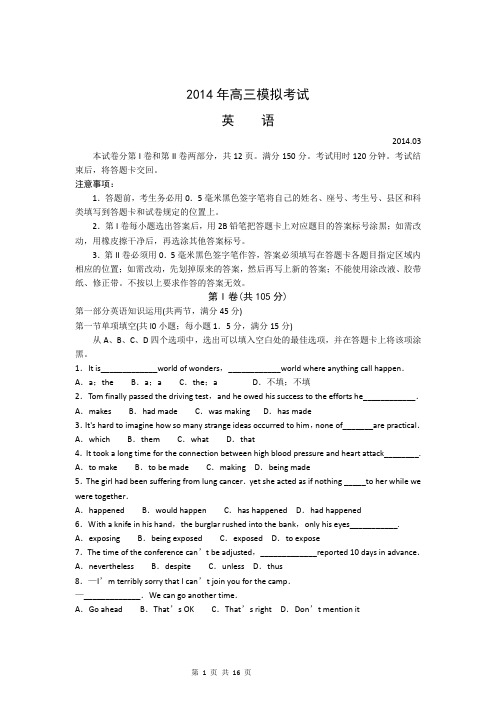
2014年高三模拟考试英语2014.03 本试卷分第I卷和第II卷两部分,共12页。
满分150分。
考试用时120分钟。
考试结束后,将答题卡交回。
注意事项:1.答题前,考生务必用0.5毫米黑色签字笔将自己的姓名、座号、考生号、县区和科类填写到答题卡和试卷规定的位置上。
2.第I卷每小题选出答案后,用2B铅笔把答题卡上对应题目的答案标号涂黑;如需改动,用橡皮擦干净后,再选涂其他答案标号。
3.第II卷必须用0.5毫米黑色签字笔作答,答案必须填写在答题卡各题目指定区域内相应的位置;如需改动,先划掉原来的答案,然后再写上新的答案;不能使用涂改液、胶带纸、修正带。
不按以上要求作答的答案无效。
第I卷(共105分)第一部分英语知识运用(共两节,满分45分)第一节单项填空(共l0小题;每小题1.5分,满分15分)从A、B、C、D四个选项中,选出可以填入空白处的最佳选项,并在答题卡上将该项涂黑。
1.It is_____________world of wonders,____________world where anything call happen.A.a;the B.a;a C.the;a D.不填;不填2.Tom finally passed the driving test,and he owed his success to the efforts he____________.A.makes B.had made C.was making D.has made3.It's hard to imagine how so many strange ideas occurred to him,none of_______are practical.A.which B.them C.what D.that4.It took a long time for the connection between high blood pressure and heart attack________. A.to make B.to be made C.making D.being made5.The girl had been suffering from lung cancer.yet she acted as if nothing _____to her while we were together.A.happened B.would happen C.has happened D.had happened6.With a knife in his hand,the burglar rushed into the bank,only his eyes___________. A.exposing B.being exposed C.exposed D.to expose7.The time of the conference can’t be adjusted,_____________reported 10 days in advance.A.nevertheless B.despite C.unless D.thus8.—I’m terribly sorry that I can’t join you for the camp.—_____________.We can go another time.A.Go ahead B.That’s OK C.That’s right D.Don’t mention it9.—Have all of you received the invitation to his party?—No,___________only some of us.A.it was B.there was C.there were D.they were10.The police are desperate to find _______is of use to help them find the murderer.A.whenever B. whichever C. whomever D.whatever第二节完形填空(共30小题;满分40分)阅读下列短文,从短文后各题所给的四个选项(A、B、C和D)中选出最佳选项,并在答题卡上将该项涂黑。
必修三 Unit3 The-Million-Pound-Bank-Note-复习

2. The government decided to bring ___i_n___ experts to advise.
3. His new novel will be brought ___o_u_t__ next week.
4. The hunter brought __d_o_w_n__ the tiger at a shot in the forest.
permit sb. to do / permit doing 同advise&forbid
3. If time permits/Time permitting (如 果时间允许), we will have a short dictation.
4. Can a foreign student work without a _w__o_r_k_p__e_rm__i_t__ (工作许可证)?
_d_is_a_p_p_e_a_r_a_n_c_e_ 4.n. 便士__p_e_n_n_y___;adj.身无分文的__p__e_n_n_il_e_s_s___
5. _s_e_e_k__vt. 寻找;探索→ _s_o_u_g_h_t → _s_o_u_g_h_t__
6. __p_a_t_ie_n_t___adj.耐心的; _p_a_t_ie_n_c_e__n. 耐心;
形容词后缀-ous :humor/humorous, danger/dangerous, fame/ famous, mountain/ mountainous, poison/ poisonous 3. v.出现 __a_p_p_e_a_r___; n. 出现;外貌__a_p_p__e_a_ra_n_c_e__; n.消失
牛津高中英语Project板块教学设计与实施[论文]
![牛津高中英语Project板块教学设计与实施[论文]](https://img.taocdn.com/s3/m/a3967a82680203d8ce2f2478.png)
牛津高中英语Project板块的教学设计与实施摘要:作者结合自身教学实践,从把握reading 和project教学关系、兼顾教学任务的完成和学生兴趣的激发、做好教材内容和引入资料的糅合、确保项目形式多样化和可操作性等四个方面阐述了高中英语project板块的教学设计与实施。
关键词:高中英语教学 project板块教学设计《牛津高中英语》project板块引导学生进行探究性学习,把英语听、说、读、写的训练从课堂内拓展到课堂外。
project的设计要充分体现“以学生为中心”代替“以教师为中心”,变“以课本为中心”为“以活动为中心”,变“以课堂为中心”为“以任务为中心”。
在日常的英语教学中很多老师把project板块当成了传统的阅读教学处理,教材的全新观念没有得到有效体现。
现笔者结合多年的高中英语教学实践谈谈对project教学设计与实施的感想。
一、分析教材,把握reading和project教学关系高中英语教材每一单元都有独立的reading板块,它承载着有关该单元主题的重要信息,还呈现了该单元的词汇和一定的语法知识。
project共有两个部分,一部分是阅读材料,另一部分是project。
该板块突出的不是阅读部分,而是旨在引导学生进行探究性学习,把英语听、说、读、写的训练从课堂内拓展到课堂外。
所以,英语老师要正确处理好reading与project之间的关系。
合理分配时间是顺利完成project的关键,千万不能在reading上耗时较多,从而造成对后部分匆匆带过,也不能忽视前部分的语言输入,这样也势必影响后者的输出,因此对于project课文的处理不能采用像reading教学一样分为导入、略读、细读、巩固、讨论的模式,以《牛津高中英语》(译林出版社)module 3 unit 3的project ancient china and rome为例,由于本课的项目是creating an illustrated time chart,而课文也是以时间为顺序,采取对比的方式对古代中国和罗马进行了描述,所以笔者先让学生通读整篇文章,迅速划出其中涉及的时间点,然后请两个同学到黑板前完成对于课文描述的一个时间表(其实书本上已经有了这个时间表,但是在让学生预习之前我已经让学生将表格用纸盖住),而其他同学就在用纸盖住的部分上划时间表,然后一起核对信息,内容比较简单,学生也很有成就感。
项目划分规范

1.基本概念水利水电工程一般划分为若干单位工程,单位工程划分为若干分部工程,分部工程划分为若干单元工程,按三级项目划分并进行质量控制。
1.1单位工程系指能独立发挥作用或具有独立的施工条件的工程,通常是若干分部工程完成后才能运行或发挥一种功能的工程。
单位工程通常是一座独立建(构)筑物,特殊情况下也可以是独立建(构)筑物中的一部分或一个构成部分。
2.2分部工程系指组成单位工程的各个部分。
分部工程往往是建(构)筑物中的一个结构部位,或不能单独发挥一种功能的安装工程。
3.3单元工程系指组成分部工程的、由一个或几个工种施工完成的最小综合体,是日常质量考核的基本单位。
可依据设计结构、施工部署或质量考核要求划分为层、块、区、段等来确定。
单元工程与国标中的分项工程概念不同,分项工程一般按主要工种工程划分可以由大工序相同的单元工程组成,如:土方工程、砼工程、模板工程、钢结构焊接工程等,完成后不一定形成工程实物量;单元工程则是一个工种或几个工种施工完成的最小综合体,是形成工程实物量或安装就位的工程。
(是国家或行业制定有验收标准的项目)水土保持生态工程即小流域综合治理工程,虽有其特殊性,但归根结底仍就是水利工程,其质量评定项目划分应结合其自身特点遵循水利水电工程项目划分的原则进行。
2.项目划分原则质量评定项目划分总的指导原则是:贯彻执行国家正式颁布的标准、规定,水利工程以水利行业标准为主,其他行业标准参考使用。
如:房屋建筑安装工程按单位工程、分部工程和分项工程划分;水工建筑安装工程按单元工程、分部工程和单位工程划分。
2.1单位工程划分原则2.1.1枢纽工程按设计结构及施工部署划分。
以每座独立的建筑工程或独立发挥作用的安装工程为单位工程。
如厂(站)房、管理(生活、办公)用房、溢洪道、输水(泄洪)洞、土(石或砼)坝、进(分)水闸、节制闸、进(出)水池、交通工程等建筑工程分别为单位工程,独立的金属结构、机电设备、电气、通讯等安装工程分别为单位工程。
牛津英语Module3 Unit3 Project
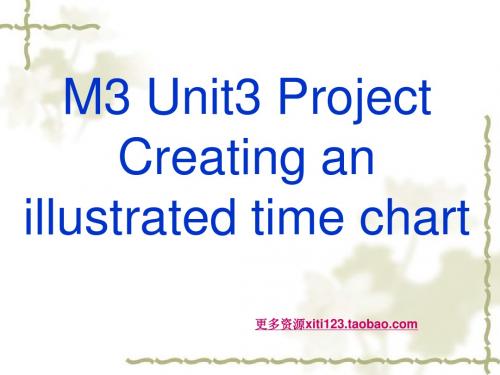
T 3. The influence of Romans spread outside
Italy in 212 BC.
F 4. By 27 BC, Rome controlled many parts
AD 1 F 5. First silk appeared in Rome in 1 BC. of Asia. Europe
●
Illustrate the time chart.
更多资源 更多资源
Homework: Our school has existed for 14 years, and we’ll celebrate its 14th anniversary(周年).Please introduce the development of our school. You can work together with your deskmates. ● Finding information from various sources. ● Discuss the information and decide what to include. ● Write the outline for the time chart.
The Confucius
(551 BC-479BC)
He influenced the development of China’s culture and education.
Emperor Qinshihuang (In 221BC) Han Dynasty created in 206 BC
Fห้องสมุดไป่ตู้
6. Roman Empire ended in AD 410. 476
高一英语M1-4短语归纳

M1-4短语M1Unit1 Reading1.一次令人享受、令人兴奋的经历2.对……感到满意3.参加集会4.坐在一个名叫安娜的女孩旁边5.赢得尊敬的最好方法6.把……献身于……7.取得高分8.听起来像……9.平均大小10.记住所有的脸和姓名是个挑战11.过去曾经12.给我许多鼓励13.每天实用英语14.花一个小时在图书馆读英语书15.免费16.在……末尾17.喜欢18.例如19.回顾20.希望做某事Unit1 Project1.由学生管理2.赞成这个主意3.负责4.远不止……,远超过……5.向……传递信息6.通知某人某事7.大声朗读8.被要求做某事Unit2 Reading1.比预料早一天2.迫不及待做某事3.后面跟着……4.环顾四周5.应该做某事6.处理,对付7.到处是垃圾8.一片混乱9.让你负责10.做出明智的决定11.不要对我吼叫!12.(灯)熄灭13.看上去不高兴14.给某人一个机会15.为某人辩解16.值得做某事17.带某人去看病18.那就是为什么……19.相反,而不是20.对……苛刻21.既然22.感觉23.惩罚某人Unit 2 Project1.感觉孤独2.日复一日3.在其他方面4.高速飞逝5.失去控制6.被看做……7.对……感到不解8.在青春期9.经历身体变化10.许多心理变化11.趋向于……12.成为冒险者13.有智慧做出正确的决定14.同时15.想要有个人谈谈16.依靠某人自己17.急需父母的爱18.感觉冷漠19.想要成为集体中的一员20.渴望独立21.平衡这些需求有困难22.不能持久23.结果是……24.和……交换Unit 3 Reading1.收到某人的来信2.过去常去体操房锻炼3.一周三次4.保持苗条5.想要一个苗条身材6.减肥7.对……感到羞愧8.服用减肥药9.受……欢迎10.变得越来越苗条11.在过去的两个月里12.感到精力充沛13.叫某人不要做某事14.躺在医院15.从肝衰竭中恢复16.后悔做过某事17.含有一种有害的化学物质18.导致某人做某事19.坚持做某事20.送某人去医院21.接受良好的医疗服务22.遵医嘱23.每天至少锻炼一小时24.吃许多蔬菜、水果25.照看,照顾26.不要为了一个苗条身材毁坏健康27.不值得28.抛锚,出故障29.对……感到难为情30.像你现在这样就很棒31.没有什么比健康更重要32.节食Unit 3 Project1.饮食和生活方式2.吃正确的食物3.经常锻炼4.除了……还有,与……一道5.跳食,不吃饭6.主要吃米饭、面包、蔬菜和水果7.帮助你系统清洁8.给你靓丽的头发9. 走路、骑自行车算10.放弃11.产生使你感到平静、放松的一些化学物质12.增加你学习时注意力集中的能力13.使你为第二天做准备14.事实上15.使你增加体重M2Unit 1 Reading 1.加紧2.搜寻一个15岁男孩3.失踪4.由于5.最后被看见6.看见某人做某事7.听见某人做某事8.径直前往9.播放音乐10.拉开窗帘11.看见一只飞船飞在外面12.站在里面的是许多皮肤白白的、眼睛大大黑黑的怪物13.吓怕了14.出现15.报警16.对……进行研究17.一直睡得不好18.询问…可能性19.负责20.编造21.排除22.调查Unit1 Project1.几百年来2.据说3.袭击村民4.高约6英寸5.长度6.使……被检查7.类似于8.十几个,几十个9.跑起来速度惊人、力大无比10.信服11.与……有关12.在某人看来13.前往,往……去14.亲眼目睹Unit 2 Reading1.忙于做某事2.安排某人的假期3.计划花几个星期旅游4.乘飞机前往……5.骑骆驼穿越沙漠6.骑骆驼旅行7.随身携带8.沿着…..河流旅游9.去漂流10.用来保护11.以防万一12.掉入水中13.到……进行一次旅行14.看野生动物15.提前16.尽可能靠近……17.尽管18.用来自卫19.靠近看……20.将在空中飞21.攀登……山22.感到恶心23.确保Unit2 Project1.发现一个神秘而美丽的地方2.正常航班3.成为一个常见的英语单词4.描绘一个美丽王国5.陡峭的山脉直插云霄6.怎样永葆青春7.拥有这样的名称8.赢得……美名9.完美的匹配10.被……覆盖11.远远高于12.构成一幅美丽的图画13.让你无法用语言表达14.像镶嵌在富饶乡村的钻石15.在绿草上漫步16.和自然和谐共处17.远离城啸18.向……提供……19.当地人的幸福家园20.一天经历4个季节Unit3 Reading1.世界最著名的探险家之一2.学画画3.对……好奇4.在……岁时5.起航6.到20世纪20年代7.作为…..出名8.遇到,碰到9.除了……还有10.调查11.不久之后12.病倒了13.一进入坟墓14.被吞噬15.死于16.跟……有关17.与……有联系18.打搅病毒19.一旦被吸入20.导致Unit 3 Project1.在轨2.有强烈愿望学飞行3.入伍4.花接下来的5年接受训练5.学习生存技巧6.被选中7.称职8.使他赢得……地位9.自我控制10.由于11.对……乐观12.为……为自豪13.敬仰14.设法做成某事15.实现梦想M3Unit 1 Reading1.笼罩在……2.迈出3.乘地铁4.扫视5.哪也找不见6.在视线里7.感觉某人做某事8.感觉某人因害怕心跳厉害9.恐惧让某人动弹不得10.伸出手去够11.盯着…..看12.住在珠江路88号13.随我来14.当心,留神15.在十字路口16.迷路17.肯定,确信18.对……感到担心19.帮助某人20.你愿意……?21.你真好22.回报,偿还23.过马路Unit 1 Project1.不同种类的2.(被)知晓已经……3.与……相反4.把……误认为……5.适合做某事6.导致7.遵循这些劝告8.被……吸引9.保持冷静10.打某人某部位11.30多倍更有可能被蛇咬12.卷起13.(把手)伸进……14.把……附在……15.释放16.消失在黑暗中17.有良好的方向感18.远达……19.往返前线20.仍然是个谜Unit 2 Reading1.由……组成2.不同于3.除了4.官方语言5.对……感到迷惑不解6.起作用,扮演一个角色7.控制,占领8.一个讲英语的名族9.导致10.用……替换……11.另一方面12.作仆人13.做出贡献14.广泛使用15.母语16.肯定的是……Unit 2 Project1.不同于……2.在于3.代表4.在许多场合5.代表不同物体6.随着时间的推移7.总的来说8.将……联合起来9.与……相对10.失明11.将......介绍给某人12.在那些日子里13.方便使用14.手指在突起的小点上划过15.实用Unit 3 Reading1.感到幸运2.赢得一个位置3.飞往4.作为……出名5.失落的文明6.占领7.倾泻而出8.在这个区域挖珠宝9.导致许多损毁10.至于……保护之下11.漫步城市12.踏脚石13.踩在烂泥里14.用……装饰15.结果(是)16.逃离城市17.分解18.留下空白19.制作逼真的塑像20.毁灭整个城市21.一个歇脚处22.据信已经做了…23.发现……废墟24.埋在沙子下25.一片绿洲26.砍伐27.导致Unit 3 Project1.可能已经做了某事2.毫无疑问3.起来反抗4.阻挡某人5.一直行进到……6.患病7.将某物在某人中分享8.在接下来的几个世纪9.作为…..的结果10.被看作……11.免费教书12.除了……还有13.对…..有深刻影响14.设问教学15.挑战学生形成并解释他们自己的论点16.使知晓17.改变主意18.接近真相19.现代哲学和科学的根基20.受够了某人21.将……告上法庭22.腐化青年23.使情况更糟24.处死25.被迫服毒M4Unit1 Reading1.习惯于2.对……做一些研究3.说服某人做了某事4.相信一个理念5.付款6.免费投放7.旨在8.教育某人关于……9.影响公共福利10.治愈口臭11.以……为自豪12.对……感到愉快13.产生头脑联想14.为公众服务15.帮某人过上更好生活16.开始一个全国范围内的公益广告活动17.处理18.当谈到……Unit 1 Project1.达到某一受众2.想象出,弄明白3.需要雇佣不同种类的媒体4.目标受众5.做一点研究和分析6.提前7.创造出合适的信息8.该做……了9.吸引10.使某人用特定的方法回应11.关心12.与…..相关13.转达(意思),表达(观点)14.主要依赖15.由于16.极大损害17.大量的18.目标受众19.劝阻某人做某事20.关心21.敦促某人做某事22.戒烟23.说服某人不要做某事24.向某人提供…..25.提醒/警告/通知某人某事26.死得太早Unit 2,Reading1.很高兴做某事2.已被邀请做某事3.谈论奥运会的历史和重要性4.每4年一次5.根据传统6.允许某人做某事7.在单独的节日8.为了……的荣誉9.使……复活10.使……成为可能11.实现梦想12.被公众注意13.重返奥运会14.在开幕式上15.知晓,了解16.获得金牌17.竞争奖牌18.作出重要贡献19.一定感到自豪20.第一个获得金牌的亚洲人21.领先22.历史上第一次23.坚持24.把欢乐带给人们25.企图做某事26.提高人类运动成就极限27.盼望Unit 2 Project1.将……放进……,使……进入2.一个漫长的过程3.满足许多要求4.这并不是全部5.使….至于控制之下6.申请7.关心8.与……有关9.考虑做某事10.在接近……末尾11.严格监视12.打败某人13.打成平局14.偶然15.某人余生9.允许某人做某事10.说明使用者想要去的方向11.增加到……里12.发出…..味/声/光13.和…..相连14.在一个案例中15.踢进致胜一球16.鼓励某人做某事17.变得更自信18.提出19.对……感到失望20.在……的便利中21.十分危险22.到……旅游23.冒险做某事24.为……提供极好的技术25.实施26.与……相比27.推荐某人做某事Unit3 Project1.发现一则秘密消息2.谈起3.将东西打包4.强迫某人做某事5.他们三人6.装满,充满7.相互打斗8.遇到9.漫步10.靠着树坐11.炸开石块12.紧紧抓住13.恐怖地14.正要做某事15.日夜穿梭16.顷刻之间17.显得又破又旧18.使机器运转19.有错误印象20.照顾。
2014年3月公共英语三级考试真题及答案
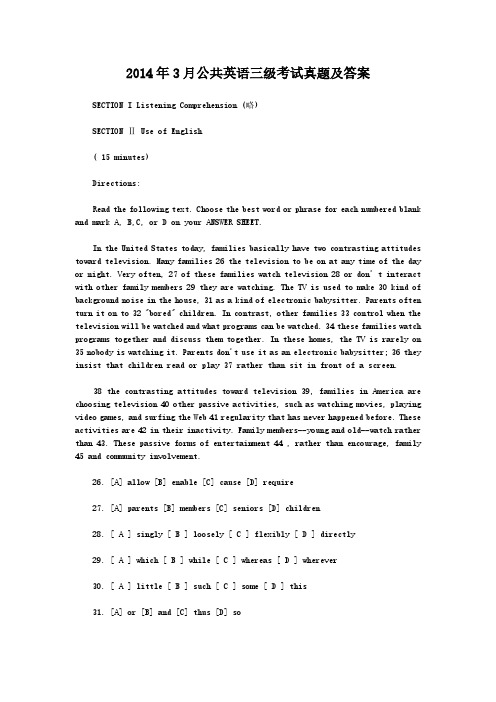
2014年3月公共英语三级考试真题及答案 SECTION I Listening Comprehension (略) SECTION Ⅱ Use of English ( 15 minutes) Directions: Read the following text. Choose the best word or phrase for each numbered blank and mark A, B,C, or D on your ANSWER SHEET. In the United States today, families basically have two contrasting attitudes toward television. Many families 26 the television to be on at any time of the day or night. Very often, 27 of these families watch television 28 or don' t interact with other family members 29 they are watching. The TV is used to make 30 kind of background noise in the house, 31 as a kind of electronic babysitter. Parents often turn it on to 32 "bored" children. In contrast, other families 33 control when the television will be watched and what programs can be watched. 34 these families watch programs together and discuss them together. In these homes, the TV is rarely on 35 nobody is watching it. Parents don't use it as an electronic babysitter; 36 they insist that children read or play 37 rather than sit in front of a screen. 38 the contrasting attitudes toward television 39, families in America are choosing television 40 other passive activities, such as watching movies, playing video games, and surfing the Web 41 regularity that has never happened before. These activities are 42 in their inactivity. Family members--young and old--watch rather than 43. These passive forms of entertainment 44 , rather than encourage, family 45 and community involvement. 26. [A] allow [B] enable [C] cause [D] require 27. [A] parents [B] members [C] seniors [D] children 28. [ A ] singly [ B ] loosely [ C ] flexibly [ D ] directly 29. [ A ] which [ B ] while [ C ] whereas [ D ] wherever 30. [ A ] little [ B ] such [ C ] some [ D ] this 31. [A] or [B] and [C] thus [D] so 32. [ A ] enlighten [ B ] entertain [ C ] move [ D ] manage [ D ] manage 33. [ A ] effectively [ B ] strictly [ C ] unwillingly [ D ] widely 34. [ A ] Never [ B ] Hardly [ C ] Seldom [ D ] Often 35. [A] if [B] even if [C] so [D] so that 36. [ A ] however [ B ] instead [ C ] moreover [ D ] therefore 37. [A] separately [B] quietly [C] creatively [D] actively 38. [ A ] Because of [ B ] In place of [ C ] In spite of [ D ] Speaking of 39. [A] viewing [R] educating [C] broadcasting [D] programming 40. [ A ] among [ B ] despite [ C ] and [ D ] as 41. [A] with [B] by [C] for [D] over 42. [ A ] usual [ B ] common [ C ] same [ D ] similar 43. [ A ] sleep [ B ] sit [ C ] eat [ D ] do 44. [ A ] weaken [ B ] end [ C ] avoid [ D ] worry45. [ A ] building [ B ] interaction [ C ] planning [ D ] reunion SECTION Ⅲ Reading Comprehension (40 minutes) Part A Directions: Read the following three texts. Answer the questions on each text by choosing A, B, C or D. Mark your answers on your ANSWER SHEET. Text 1 Nisaburo and Hiroko Ohata are unlike most Japanese couples their age. Sure,Hiroko,58, is worried about her husband' s high blood pressure, while Nisaburo,60, promises his wife that if she loses 18 pounds they' 11 take a trip abroad. What makes the Ohatas different is how they met, through a matchmaking organization for single seniors. " On the second date, he asked if I wanted to meet his family," says Hiroko. "I took that as a proposal. " A little rushed, perhaps, but 17years after his wife' s death, Nisaburo knew he' d found a new wife. The couple just celebrated four years of marital happiness last month. In the past, people like Nisaburo and Hiroko might have chosen to live out their lives alone. But as Japan' s society ages, attitudes about love and remarriage late in life are changing. In 2006,according to government data, three times more men and nearly five times more women in their 60sand 70s married for at least the second time, compared with 20 years before. Granted, change is slow. For this silver-haired population, the concept of "dating" is still masked by the term ocha nomi tomodachi (friends having tea together). And older people often need help meeting prospective mates. That' s where specialized matchmaking services such as Ai Senior--" Love Senior"--come in. When Shunichi lkeda started the online service three years ago, he was surprised by how many visits he was getting from people in their 60s. Ikeda says that his clients have an "American perspective" about the dating scene. And their children are often very supportive, sometimes being the ones to register parents. "More older people are realizing that life is supposed to be enjoyable--not lonely," says Ikeda. About 17% of the matchmaking clients in Japan are over 50 years old, according to Ai Senior, and seniors' market share has more than doubled over the past three years. "For older, single men, even doing laundry or cooking is difficult," says Ikeda. "They want to live with a woman. Likewise, it can be boring for women living alone. They want to provide for someone. " 46. According to the writer, the Ohatas are different from most senior Japanese couples in that______ [A] they remarried with the help of an agency[B] they decided to marry on the second date[C] the husband suffers from a health problem[D] the wife is concerned about losing weight 47. As is implied in the text, Nisaburo' s proposal on the second date might be considered______ [A] typical of single seniors [B] irresponsible to his family [C] a surprise to the woman [D] a decision made in haste 48. In Japan, the change in attitudes about remarriage results from an increase in [A] its population [B] single women______ [C] senior people [D] the divorced 49. According to Ai Senior, the matchmaking clients in Japan______ [A] admire the American lifestyle [B] are mostly under 50 years of age [C] share a vague term for "dating" [D] doubled over the past three years 50. According to Ikeda, more single seniors remarry in order to______ [A] live a longer life [B] solve financial problems [ C ] make their life enjoyable [ D ] support their children together Text 2 When you become a parent, much of your focus shifts from your own future to your kids' future. But one of the most effective ways to help your children learn to dream big is to ensure that your own dreams don' t get pushed aside by everyday demands. Our everyday experiences provide learning opportunities. When you tap into them, you create a lifelong learning habit that will always keep you growing. Even your most disappointing experiences can be turned into breakthroughs. Every dream begins in the imagination. Take a few minutes to sit down with a notebook and think about where you would like to be in 20 years. Write down details about all aspects of your ideal life. Feel free to imagine. Don' t worry about whether you know how to get there now—you have 20 years to figure that out. You can also start by picking a year in the future and making a collection of things you' d like in your life by then. Check in on it from time to time to see where you've made progress. We're often encouraged to work on our weaknesses, but working on your strengths is easier and creates better results. For help of identifying them, ask some friends, or colleagues to write down what they most appreciate about you. They' ll enjoy doing this, and you' 11 feel great when you read the responses. Once you know your strengths, you can put them to work to help you achieve your dreams. Confidence is the foundation for all your other abilities. "Progress, notperfection" is a great saying to keep your confidence high. Every night, write down five achievements that happened that day. Big or small, it doesn' t matter. If proper, add ideas for further progress and actions you can take to get started. Find ways to add what you love to do to your life now. This will give you more energy and keep you connected with your bigger dreams. Making a list of old hobbies is a great way to restore your old passions. Things you' re enthusiastic about come with their own store of energy. Connecting with them can give you a push when you most need it. 51. In order to help your children to dream big you must______ [ A] fulfill everyday tasks [ B ] build your own career [C] keep your own dreams [ D] make them look ahead 52. The writer suggests that, to begin your big dream, you should______ [A] stretch your imagination [ B ] have a best-laid plan for 20 years [ C ] recollect all your likes and dislikes [D] engage yourself in lifelong learning 53. According to the writer, to achieve our dreams, we should______ [ A] work on our strengths [ B ] develop our creativity [ C ] identify our weaknesses [ D ] seek advice from friends 54. To keep high confidence, it is important for one to______ [ A ] take appropriate actions [ B ] notice his daily progress [ C ] try his best in everything [ D ] form new ideas every day 55. The writer thinks that one can hold fast to his dream by______ [ A ] listing the details of his ideal life [B] improving some of his old hobbies[C ] adding new ideas to his old dreams [ D ] energizing himself with old passions答案 第一部分听力(略) 第二部分英语知识运用 参考译文 如今,美国家庭对于电视基本上存在着两种对立的态度。
UNIT 32014版秋九年级英语

UNIT 32d Role-play the conversation.He Wei: This is Fun Times Park — the biggest amusement park in my city!Alice:I’m excited to try the rides!He Wei: Where should we start? Th ere’s Space World, Water World, Animal World ...Alice: Oh, could you tell me where the restrooms are first?He Wei: Pardon? Restroom? You already want to rest? But we haven’t even started yet!Alice: Oh no, I don’t mean a room for resting. I mean ... you know, a washroomor bathroom.He Wei: Hmm ... so you mean ... the toilets?Alice:Yes! Sorry, maybe the word “restroom” is not commonly used in China.He Wei:Right, we normally say “toilets” or “washrooms”. Th ey’re just over there.Alice:OK. I’ll be quick! I wonder when the park closes today. He Wei: Nine-thirty, so you don’t need to rush!3a Read the conversation and answer the questions below.Fun Times Park — Always a Fun Time![Alice and He Wei are in Space World]Alice: I wonder where we should go next.He Wei: How about that new ride over there?Alice: Oh ... it looks pretty scary.He Wei:Come on! I promise it’ll be fun! If you’re afraid, just shout or hold my hand.[After the ride]Alice: You were right, that was fun! I was scared at first, but shouting really did help.He Wei: See, that wasn’t so bad, right? You never know until you try something.Alice: Yes, I’m so glad I tried it. Now I know I can do it and it’s actually fun!He Wei: Do you want to go to Water World now?Alice:Sure, but I’m really hungry. Do you know where we can get some good food quickly?He Wei: Of course! I suggest Water City Restaurant in Water World. It’s a fastfood place. It serves delicious hamburgers and hot dogs.Alice: That sounds perfect![On their way to Water City Restaurant, Alice and He Wei passby Uncle Bob’s.]Alice: Oh, look! Th is restaurant looks interesting. It seems a rock band plays there every evening.He Wei:Maybe we can come here for dinner later. Let’s ask what time the band starts.[Alice and He Wei walk up to a staff person at the door.]He Wei: Excuse me, could you tell us when the band starts playing this evening?Staff: Eight o’clock. It’s always busy, so come a little earlier to get a table.He Wei: OK, thanks!2bCould You Please ...?When you visit a foreign country, it is important to know how to ask for help polit ely. For example, “Where are the restrooms?” or “Could you please tell me where the restrooms are?” are similar requests for directions to a place. Both are correct English, but the first one sounds less polite. That is because it is a very direct question. It is not enough to just ask a question correctly. We also need to learn how to be polite by being less direct — or more indirect — when we ask for help.In English, as in Chinese, we change the way we speakwhen we talk with different people. The expressions you use might depend on whom you are speaking to or how well you know them. If you say to your teacher, “When is the school trip?”,this might sound impolite. But if you say, “Excuse me, Mr. West. Do you know when the school trip is?”, this will sound much more polite. However, it is all right to ask direct questions in some situations, like with your classmates.Usually polite questions are longer and include more language such as “Could you please ...?” or “Can I ask ...?” It sounds more polite to s ay, “Peter, could you please tell me your e-mail address?” than “Peter, tell me your e-mail address.” Sometimes we even need to spend time leading in to a request. For example, with a stranger on the street, we might fi rst say, “Excuse me, I wonder if you can help me” or “I’m sorry to trouble you, but ...” before asking for help.It might seem more difficult to speak politely than be direct. However, it is important to learn how to use proper language. This will also help you become better at English, or any other language you wish to speak.。
人教社2014版九年级英语全一册各单元要点 Unit 3

人教社2014版九年级英语全一册各单元要点Unit 3贵阳市乌当中学高力超重点单词转换1.restroom (rest+room) --washroom--WC----bathroom--toilet2.bookstore (book+store)--bookshop3.beside--by--besides--but--except4.postcard (post+card)5.pardon--pardon--excuse6.normally--normal--usually7.rush--rush--rapid--hurried8.suggest--suggestion--advise--advice9.central--centre/center--middle10.nearby (near+by)11.mail--mail--post12.east--east--east--eastern--eastward--south--southern--west--western--north--northern13.inexpensive (in+expensive)--cheap--expensive14.uncrowded (un+crowd+ed)--crowded15.politely--polite--impolite16.request--request--need--want--require17.direction--director--direct18.correct--correctly--right--proper--true--wrong19.polite--politely--impolite20.direct--director--direction21.speaker--speak--spoke--spoken--speech22.whom--who--whose23.underground (under+ground)--subway--metro24.course--subject词组1.post office2.department store3.a pair of shoes4.how to get to the bookstore5.go along Main Street6.pass Center Street7.on your right beside the bank8.the third floor9.turn left10.the second floor11.turn right12.between...and...13.the flower store14.go past15.Fun Times Park16.the biggest amusement park17.try the rides18.start with19.Space World20.Water World21.Animal World22.before we decide23.no problem24.don’t need to rush25.be special about26.a fun time27.that new ride over theree on29.be scared30.at first31.did help32.get hungry33.Water City Restaurant34.serve delicious food35.on one’s way to...36.pass by37.a rock band38.walk up to39.at the door40.at that time41.a little earlier42.the Central Library43.the Italian restaurant nearby44.get something to eat45.get to46.a nearby restaurant47.pardon me48.mail a letter49.in the shopping center50.go east51.the corner of52.a good place to eat53.what kind of food54.make polite requests55.ask for help politely56.for example57.similar requests for directions58.sound less polite59.a very direct question60.ask a question correctly61.how to be polite62.the way they speak63.in different situations64.the expressions they use65.depend on66.whom they are speaking to67.know each other well68.say to69.sound impolite70.much more polite71.such as72.e-mail address73.spend time doing sth74.lead in to a request75.seem more difficultmunicate with sb77.an underground parking lot78.the way to...79.the course you will study80.introduce yourself81.thank sb for doing sth82.look forward to83.turn right on Lake Street句型1.Could you please tell me where the restrooms are?2.Excuse me, could you please tell me how to get to the bookstore?3.Sure, just go along Main Street until you pass Center Street.4.The bookstore is on your right beside the bank.5.Do you know when the bookstore closes today?6.The supermarket is between the flower store and the bookstore.7.Excuse me, do you know where I can get some postcards?8.There’s a bookstore between the bank and the supermarket.9.What should we start with?10.Before we decide, could you first tell me where the restrooms are?11.You don’t need to rush.12.What is special about Uncle Bob’ restaurant?13.How about that new ride over there?14.Well...it looks scary.15.I promise it’ll be exciting.16.If you’re scared, just shout or hold my hand.17.I was scared at first, but shouting did help.18.You never know until you try something.19.Yes, I’m so glad I tried it.20.It serves delicious food.21.On their way to Water City Restaurant, Alice and He Wei pass by Uncle Bob’s.22.The sign says a rock band plays here every evening.23.Why don’t we come back here for dinner later?24.Alice and He Wei walk up to a staff person at the door.25.Excuse me, could you tell us when the band starts playing this evening?26.The restaurant is always busy at that time, so come a little earlier to get a table.27.I wonder where we should go next.28.How do I get to the Central Library?29.Could you tell me where I can get something to eat?30.Excuse me, can you tell me how I can get to a nearby restaurant?31.Pardon me, do you know if there’s a restaurant around here?32.Sally needs to mail a letter.33.Excuse me, could you please tell me where the nearest bank is?34.Sure. You go east along this street...35.Can you tell me where there’s a good place to eat?36.What kind of food do you like?37.Where do you need to make polite requests?38.Both are correct, but the first one sounds less polite.39.That is because it is a very direct question.40.It is not enough to just ask a question correctly.41.We also need to learn how to be polite when we ask for help.42.Good speakers change the way they speak in different situations.43.The expressions they use might depend on whom they are speaking to or how well they know each other.44.It is all right to ask direct questions to your classmates because you know them well.45.However, if you say to your teacher,”When is the school trip?”, this might sound impolite.46.But if you say,”Excuse me, Mr. West. Do you know when the school trip is?”,this will sound much more polite.47.Sometimes we even need to spend time leading in to a request.48.It might seem more difficult to speak politely than directly.49.This will help you communicate better with other people.50.There is an underground parking lot over there.51.--Where’s the post office? --Sorry. I can’t help you.52.Could you tell me what just happened?53.Could you possibly tell me the way to the village school?54.Imagine you are going on a short study vacation at a school in an English-speaking country.55.I would like to thank you for...56.I’m looking forward to your reply.57.You’re always in a rush to get to school on time.58.Could you tell me which place would be a good choice for me to go to?语法1.Excuse me, do you know where I can buy some medicine?Sure. There’s a supermarket down the street.2.Could you please tell me how to get to the post office? Sorry, I’m not sure how to get there.3.Could you tell us when the band starts playing this evening? It starts at 8:00 p.m.4.I wonder where we should go next.You s hould try that new ride over there.。
35. M3 U3 Task-Project(教师版)
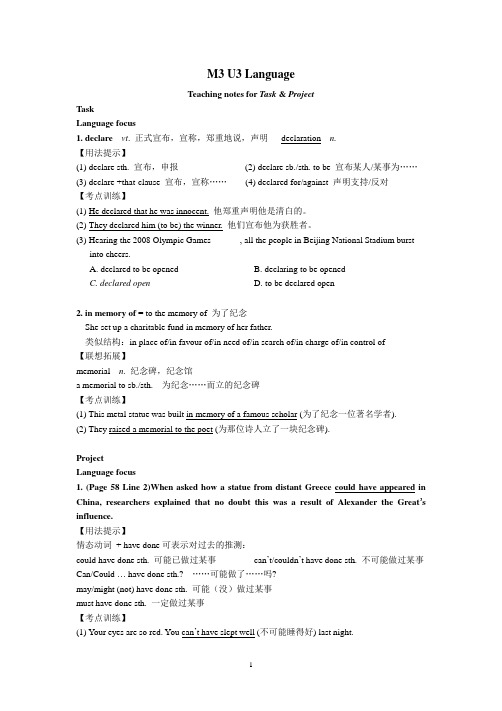
M3 U3 LanguageTeaching notes for Task & ProjectTaskLanguage focus1. declare vt. 正式宣布,宣称,郑重地说,声明declaration n.【用法提示】(1) declare sth. 宣布,申报(2) declare sb./sth. to be 宣布某人/某事为……(3) declare +that-clause 宣布,宣称……(4) declared for/against 声明支持/反对【考点训练】(1) He declared that he was innocent. 他郑重声明他是清白的。
(2) They declared him (to be) the winner. 他们宣布他为获胜者。
(3) Hearing the 2008 Olympic Games ______, all the people in Beijing National Stadium burstinto cheers.A. declared to be openedB. declaring to be openedC. declared openD. to be declared open2. in memory of = to the memory of 为了纪念She set up a charitable fund in memory of her father.类似结构:in place of/in favour of/in need of/in search of/in charge of/in control of【联想拓展】memorial n. 纪念碑,纪念馆a memorial to sb./sth. 为纪念……而立的纪念碑【考点训练】(1) This metal statue was built in memory of a famous scholar (为了纪念一位著名学者).(2) They raised a memorial to the poet (为那位诗人立了一块纪念碑).ProjectLanguage focus1. (Page 58 Line 2)When asked how a statue from distant Greece could have appeared in China, researchers explained that no doubt this was a result of Alexander the Great’s influence.【用法提示】情态动词+ have done可表示对过去的推测:could have done sth. 可能已做过某事can’t/couldn’t have done sth. 不可能做过某事Can/Could … have done sth.? ……可能做了……吗?may/might (not) have done sth. 可能(没)做过某事must have done sth. 一定做过某事【考点训练】(1) Your eyes are so red. You can’t have slept well (不可能睡得好) last night.(2) My MP4 player isn’t in my bag. Where can I have put it? (我可能把它放哪儿了呢?)(3) My book, The house of Hades, is missing. Who could have taken it? (谁可能拿了它呢?)(4) The children must have got lost (一定迷路了) in the woods; otherwise, they would have beenat the lakeside camp as scheduled.(5) —I left my handbag on the train, but luckily someone gave it to a railway official.—How unbelievable to get it back! I mean, someone ______ it.A. will have stolenB. might have stolenC. should have stolenD. must have stolen2. (Page 58 Line 15) By the age of thirty, he had already occupied more land than anyone before, and it seemed that more glory was waiting ahead of him.▶ahead adv. (时间、空间)在前面;提前,预先;领先【考点训练】(1) Walk straight ahead (径直朝前走) until you reach a crossroads.(2) The party was planned weeks ahead (提前几周).【联想拓展】ahead of sb./sth.(1) (空间)在……前面在我们面前坐落着一座古老的庙宇。
外研版八年级英语下册第3模块学案M3U3
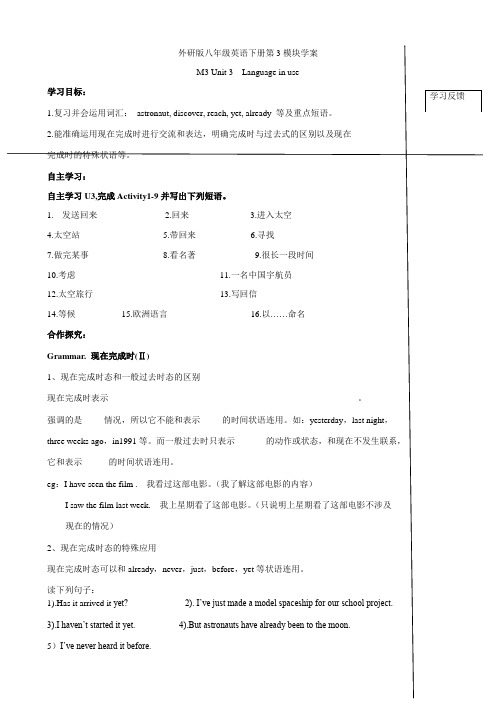
比较总结:现在完成时态可以和_________,___________,___________,_________和__________等状语连用.already表示“已经”,用于_________(肯定/否定)句,放在句中,助动词have/has之_______(前/后),过去分词之(前/后)。
just 表示“刚刚”,用于________ 句,放在句 ________。
yet 表示,“尚,未”,用于_______和_______句,放在句________ 。
巩固练习:一、句型转换I see the space station on TV.(按要求改写句子)1、________________________ (一般过去时,last night)2、________________________ (一般疑问句,last night)3、________________________ (现在完成时,just)4、________________________ (现在完成时否定句,yet)have/ has been in 意为____________,并且常和表示____________ 的时间状语连用。
用have/has been/ gone (to) 填空1. A spaceship _____________ Mars. It is coming back to earth next year.2.Lots of astronauts ________________ to the space station. They found it very interesting.3.–Where _______ you __________? –I _________________ the library.4.–Is Mr Smith at home? --No, he ____________________ town.达标检测:短文填空Today many people like reading stories about UFOs. In many countries,people are(1)UFOs.But what are UFOs?There are some different ideas about UFOs. (2) those saying, the most popular one is that they carry visitors coming from other stars. They seem to fly much faster than planes.Some UFO (3) and many other people(4) these ideas. Some people said that they saw a few UFOs land on the (5) . Some people said they saw some strange visitors coming out of the UFOs. Some even said they were carried away in the UFOs, and then weresent (6) by the strange visitors.Some people made (7) when they said they had seen UFOs. (8) theysaw a weather balloon or an uncommon plane. sometimes they saw the light from the moon.But there are a lot of things we can`t understand. Now, people still can`t understand UFOs (9). It may (10) many years to find a clear answer and then people will give UFOs another name.语法归纳:反思:。
高中英语必修三学案M3 Unit 3 Project Ancient Greek statue found in Xinjiang 第九课时

池州华佑高级实验中学人本跨界大课堂自主学习型英语学道堂组姓名编号M3 unit3(9) 日期2017-04- 16 主备校长备课组高一英语组【佳句欣赏】(大声朗读三遍):Keep good men company and you shall be of the number. 近朱者赤,近墨者黑。
【自研课导学】(时段:晚自习)预习内容及目标:预习课本P58的内容,借助字典查出所有的生词,了解课文的内容。
【晨读课】 1. 熟读unit3 所有的单词2. 大声自由朗读unit3 reading 和project 的文章。
【展示课导学】(一)学习内容:M3 Unit 3 Back to the past Project: Ancient Greek statue found in Xinjiang 第九课时(二)学习主题:1.掌握这篇文章的主旨大意。
2. 掌握这篇课文里的知识点。
(三)定向导学·互动展示【训练课导学】1.时段:晚自习 2.时间:20’ 3.训练方式:独立,自主完成“日日清过关”巩固提升三级达标训练题姓名自评:师评:批阅日期:一、基础题英译汉1. on board 6. no doubt2. in memory of 7. stand in one’s path3. have a deep influence on 8. come down with4. declare war against 9. get tired of5. rise up against 10. aside from二、提高题单选1. Larry asks Bill and Peter to go on a picnic with him, but of them wants to, because they have work to do.A. eitherB. anyC. neitherD. none2. Ladies and gentlemen, please remain until the plane has come to a complete stop.A. seatedB. seatingC. to seatD. seat3. “QQ” on the Internet as well as e-mails and mobile phones an important role today in daily communication.A. would playB. are playingC. have playedD. is playing4. Every possible means to increase the income of the people in the rural areas.A. has been takenB. have been takenC. has takenD. have taken5. The valuable paintings under the ground for many years were still.A. burying; out of conditionB. were buried; out of conditionC. were buried; in good conditionD. buried; in good condition6. Just in front of our house with a history of 1,0000 years.A. does a tall tree standB. stands a tall treeC. a tall tree is standingD. a tall tree stands7. ----I reminded you not to forget the appointment.----.A. So you didB. So I do notC. So did youD. So do I8.With a lot of trees and flowers on both sides, the newly-built highway does look beautiful.A. plantedB. plantingC. to be plantedD. being planted9. ----What did the manager tell you to do?----He said that he’d like to see the project before he returned from Japan.A. carried awayB. carried outC. carry outD. carry away10. ----I’m not good at basketball, you know.----. We are playing for fun. Just try and you’ll see you can do it.A. Well, it dependsB. Take your timeC. Come onD. Tha t’s OK11. The basketball coach, as well as his team, interviewed shortly after the match for their outstanding performance.A. wereB. wasC. isD. are12. ----John, when shall we meet again, Thursday or Friday?---- . I’ll be off to London then.A. EitherB. NeitherC. BothD. None今日心得:今日不足:【培辅课】(时段:附培辅单)疑惑告知:效果描述:1. 在船上2. 纪念3. 对……有深远影响4. 向……宣战5. 起义,反抗6. 无疑,确实7. 阻碍,挡道8. 患(病)9. 对……厌烦10. 除开……以外1~5 C A D A D 6~10 B A A B C 11~12 C B。
上 M3Unit 3 第一课时
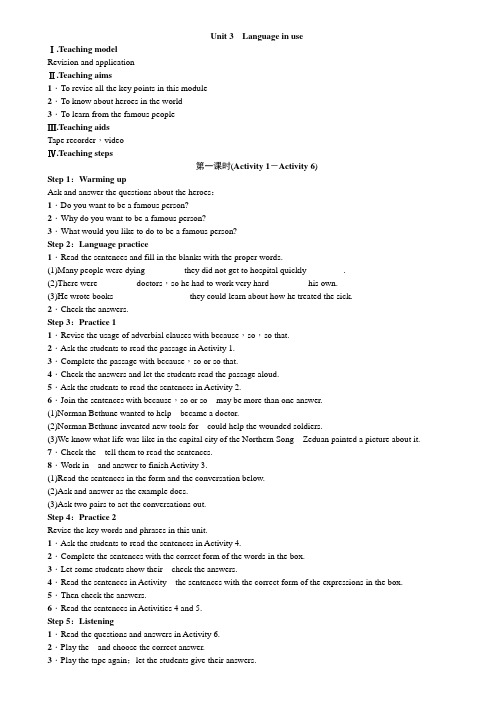
Unit 3Language in useⅠ.Teaching modelRevision and applicationⅡ.Teaching aims1.To revise all the key points in this module2.To know about heroes in the world3.To learn from the famous peopleⅢ.Teaching aidsTape recorder,videoⅣ.Teaching steps第一课时(Activity 1-Activity 6)Step 1:Warming upAsk and answer the questions about the heroes:1.Do you want to be a famous person?2.Why do you want to be a famous person?3.What would you like to do to be a famous person?Step 2:Language practice1.Read the sentences and fill in the blanks with the proper words.(1)Many people were dying ________ they did not get to hospital quickly ________.(2)There were ________ doctors,so he had to work very hard ________ his own.(3)He wrote books ________ ________ they could learn about how he treated the sick.2.Check the answers.Step 3:Practice 11.Revise the usage of adverbial clauses with because,so,so that.2.Ask the students to read the passage in Activity 1.3.Complete the passage with because,so or so that.4.Check the answers and let the students read the passage aloud.5.Ask the students to read the sentences in Activity 2.6.Join the sentences with because,so or so may be more than one answer.(1)Norman Bethune wanted to help became a doctor.(2)Norman Bethune invented new tools for could help the wounded soldiers.(3)We know what life was like in the capital city of the Northern Song Zeduan painted a picture about it. 7.Check the tell them to read the sentences.8.Work in and answer to finish Activity 3.(1)Read the sentences in the form and the conversation below.(2)Ask and answer as the example does.(3)Ask two pairs to act the conversations out.Step 4:Practice 2Revise the key words and phrases in this unit.1.Ask the students to read the sentences in Activity 4.2.Complete the sentences with the correct form of the words in the box.3.Let some students show their check the answers.4.Read the sentences in Activity the sentences with the correct form of the expressions in the box. 5.Then check the answers.6.Read the sentences in Activities 4 and 5.Step 5:Listening1.Read the questions and answers in Activity 6.2.Play the and choose the correct answer.3.Play the tape again;let the students give their answers.4.Check the answers.5.Read the listening material after the tape.Step 6:Homework1.Revise all the key points in this module.2.Finish the workbook.Blackboard DesignUnit 3Language in use 1.in space2.travel into space3.take off4.on earth5.around the world6.look after7.be in need of8.dream of doing sth.9.thousands of10.in the nineteenth century11.be proud of。
睢宁县菁华中学高中英语“四步教学法”教案:MUnitBacktothepastProject(2)

教明标自学
过程设计
二次备课
Step1 Showing the leaching aims
Teaching objectives:
1. Enable the students to master the main language points freely.
2。 Enable the students to apply the language points into practical exercises。
Step4 Presentation
1. no doubt
无疑,很有可能 (doubt在此为名词)
他能按时来是毫无疑问的。
There is no doubt that he can come on time。
•doubt v. 怀疑,对…无把握
选词填空:that与whether
I don’t doubt _____ he will help me。
3。 I don’t feel well. I think I’m _____ with the flu.
A. keeping up B. catching up
C。 coming up D. coming down
4。 By the time John gets home, her mother _______ forLondonto attend a lecture.
(2)示威游行,抗议游行
警方决定不禁止这次示威游行。
The police decided not to ban the march。
拓展
march on 继续行进;向…行进
on the march 在行进中;在行军中
keys

1.in 2.back 3.nationally 4.up
5.on 6.under 7. for 8.but
M3 Unit1 Reading
ual 2. by 3. there 4. like
5. with 6. the 7. to 8. but
Module 5 Unit 3 Reading
1.that 2.like 3.agreement 4.or
5.not 6.with 7.to8.place
Module 5 Unit 3 Project
1.really2.eventually3.on4.However
5.against6.unless7.while8.without
Module 2 Unit3 Reading
1.than2.gone3.over4. to 5. in6 .had 7.should 8. the
Module 1 unit 2 Project
1. everything2. still3. though4. instead
5. either6. valuable7. an8. without
Module 1 UnitThree Reading
Module 5Unit 1reading
1. dilemma2. since 3.badly4.betrayed
5. missing6. guilty 7. at8. disagreement
Module 5Unit 1project
1. puzzling2. towards 3. difference4.before
Module 4 Unit 1
Project
- 1、下载文档前请自行甄别文档内容的完整性,平台不提供额外的编辑、内容补充、找答案等附加服务。
- 2、"仅部分预览"的文档,不可在线预览部分如存在完整性等问题,可反馈申请退款(可完整预览的文档不适用该条件!)。
- 3、如文档侵犯您的权益,请联系客服反馈,我们会尽快为您处理(人工客服工作时间:9:00-18:30)。
M3 Unit 3 Project自主学习一(单词英汉互译)ancient Greek _____________ 雕塑,雕像_______________ 宣布_______________发现n._______________ 最近adv._______________ 遥远的_______________解释v. _______________(n_______________.) 影响_______________ Alexander the Great____________击败_______________ battle _______________troop_______________ victory_______________ 无休止的战斗__________________ occupy_______________ glory_______________ 在前面_______________博物馆_______________ Urumqi _______________自主学习二(短语,用记号笔在书上标出)1.对...进行研究___________________________2.毫无疑问__________________________3.在...岁时__________________________4.起义,反抗__________________________5.取回,收回__________________________6.中东__________________________7.阻碍某人__________________________8.长驱直入__________________________9.阻止某人做__________________________10.对...变得厌倦__________________________11.往回走,掉过头__________________________12.在某人前面等着________________________13.染上,得了(病)________________________14.在...之间分配__________________________15.接下来的几百年________________________16.起因,由于...的结果__________________17.被认为是...________________________ 18.挣薪水________________________19.除此之外________________________20.对...了解甚少_______________________21.对...有着深刻的影响_________________22.在很多情况下_______________________23.使某人明白/意识到__________________24.苏格拉底问答法_____________________25.受够了,厌倦________________________26.把某人告上法庭,向法院控诉___________________________________27.对某人的庭审中_____________________28.使情况/局势更糟____________________29.被处以死刑________________________30.寻找,探求_______________________Ancient Greek statue found in Xinjiang合作探究Task 1 Main idea of each partPart 1 (para 1) The __________________of ancient Greek statue in Xinjianga. It was _______________ in northern Xinjiang, Chinab. It is a metal Greek soldier, coming to China as a result of _______________.c. It is now shown in a museum in Urumqi, ______________ of Xinjiang.Part 2 ( para 2—3) Big _______________ about AlexanderA. In 356 BC, _____________________________________.B. In 336 BC, _____________________________________________.C. In 334 BC. ________________________________________________________________.D. By 326 BC, _____________________________________________________________.E. In 323 BC, _________________________________________________________________. Part 3 (para 4) Alexander’s ___________________ on the world.Alexander the Great spread the Greek culture from Europe to Africa and Asia, influencing the world for centuries to come.Task 2. Questions1.Where was the statue discovered in Xinjiang probably from? (no more than 3 words)________________________________________________________.2.When did Alexander become a Greek king? (no more than 6 words)________________________________________________________.3. What was his ambition? (no more than 6 words)___________________________________________________________________.4. Did his own army always support him? Why or why not?____________________________________________________________________.5.How old was he when his kingdom became the largest in the world? (no more than 5 words)___________________________________________________________.6. What happened to his kingdom after he died?(no more than 8 words)___________________________________________________________________.Task 3 True or false1. Alexander became king before his father died. ( )2. In around 326 BC, Alexander had almost ruled more land than anyone before. ( )3. Alexander turned back because of the failure of his own army. ( )4. Alexander only had 3000 in 334 BC. ( )Task 4. Reading comprehension.1.Why was the statue found in China?( )A. Because China was once controlled by RomeB. Because people in China and Rome had the trade in the 3rd century BCC. Because Alexander the Great had great influence on Asia thenD. Because Alexander the Great had already occupied more land than anyone before2. Which is TRUE about Alexander the Great? ( )A. He had a son who had become the Greek king.B. In 334 BC, he took his army of 3, 000 troops into the Middle EastC. Finally, he died in the battle at the age of 33.D. By 326 BC, he had already occupied more land than anyone before.3. The phrase “stood in his path” in line 11 probably means_______________.A. stopped him doing somethingB. stood with themC. walked on the streetD. tried to help him4. Which word or phrase can replace the phrase “as a result of” in line 21-22? ( )A. instead ofB. in spite ofC. because ofD. regardless ofThe father of Western philosophyTask 1: Read The father of Western philosophy and try to get the main idea of each paragraph. Paragraph 1: the ______________ of philosophyParagraph 2: brief ______________to SocratesParagraph 3: ____________ _____________: asking questions until you reach the right answer. Paragraph 4: ______________ for Socrates’deathTask 2: Careful reading1.What does the word ‘philosophy’mean? (no more than 7 words)______________________________________________________________________________ 2. Who was Socrates? (no more than 6 words)______________________________________________________________________________ 3.What was his special way of teaching? (no more than 6 words)______________________________________________________________________________ 4. What is the basis of modern philosophy and science? (no more than 12 words)______________________________________________________________________________ 5. What do people think of him? (no more than 15 words)______________________________________________________________________________。
